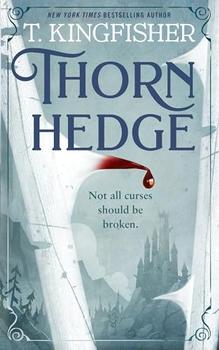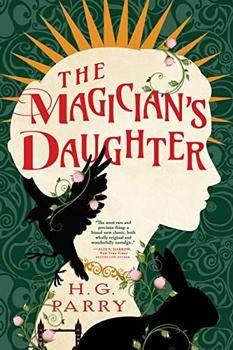Summary | Excerpt | Reviews | Beyond the book | Read-Alikes | Genres & Themes | Author Bio

You probably think you know the story of Sleeping Beauty, about the beautiful princess cursed by an evil fairy to sleep for a hundred years in a castle surrounded by a wall of thorns. You might remember the 1959 Walt Disney movie or the Charles Perrault fairy tale on which it was based, or you might be familiar with retellings, such as those by Robin McKinley, Neil Gaiman, or Jane Yolen, among many others. But T. Kingfisher's novella Thornhedge is unlike any previous imagining of this classic tale; as she explains in an afterword, her version started from an unconventional premise: "Why would you trap someone inside a hedge of thorns, anyway? Because you wanted to contain her. Because she was dangerous..."
In Thornhedge, readers barely even see the so-called Sleeping Beauty (though when they do encounter her, they won't soon forget her), and she certainly isn't the novella's protagonist. Instead, that honor belongs to Toadling, a shapeshifting woman who stands guard outside the castle, keeping away curious onlookers and would-be heroes, and witnessing plagues and wars and more than two hundred years of passing time. But just when Toadling starts to relax, convinced that maybe the overgrown hedge and humans' fading memories will keep her secret safe, along comes Halim.
He's the first person Toadling has talked with in centuries, and the first one to whom she tells her own story, of how she was born a human and spirited away by fairy folk when she was less than an hour old, of how she was thrown to the greenteeth, "slimy swamp-dwelling spirits who devour unwary swimmers" but who chose to spare this child and to raise her surrounded by unconditional love. She reveals to Halim how she discovered her ability to transform into a toad, and how she found herself growing gradually less human and more...something else. And, at last, she confesses to him what she was once sent back to her birthplace to do, and how she has spent the rest of her life trying to compensate for one little slip of the tongue. But what if Halim, like so many other "roving princes and penniless younger sons" before him, insists on seeing the castle's sleeping beauty for himself?
Kingfisher, who also writes children's books under the name Ursula Vernon, knows how to spin a compelling tale. Toadling's story—and the castle's lurking secrets—unfold gradually, interspersed with scenes depicting her growing friendship with Halim. As the narrative progresses, so does readers' sense of mounting horror and dread, as they realize just how high the stakes are, even as they, like the curious Halim, might want to see the truth for themselves.
Kingfisher consistently upends expectations, whether by having her aspiring Prince Charming be a Muslim refugee from Anatolia (modern-day Turkey), or by making her heroine not the sleeping princess but the ugly creature who cursed her. She most certainly subverts suppositions about what love looks like, not only romantic love but also the love between children and the parental figures who care for them. Thornhedge is a fairy tale that feels both classic in its tone and thoroughly contemporary in its outlook, with a remarkable protagonist whom readers won't soon forget.
![]() This review
first ran in the September 6, 2023
issue of BookBrowse Recommends.
This review
first ran in the September 6, 2023
issue of BookBrowse Recommends.

If you liked Thornhedge, try these:

by T. Kingfisher
Published 2025
From New York Times bestselling and Hugo Award-winning author T. Kingfisher comes A Sorceress Comes to Call―a dark reimagining of the Brothers Grimm's The Goose Girl, rife with secrets, murder, and forbidden magic.

by H.G. Parry
Published 2023
In the early 1900s, a young woman is caught between two worlds in H. G. Parry's spellbinding tale of miracles, magic, and the adventure of a lifetime.
Your guide toexceptional books
BookBrowse seeks out and recommends the best in contemporary fiction and nonfiction—books that not only engage and entertain but also deepen our understanding of ourselves and the world around us.